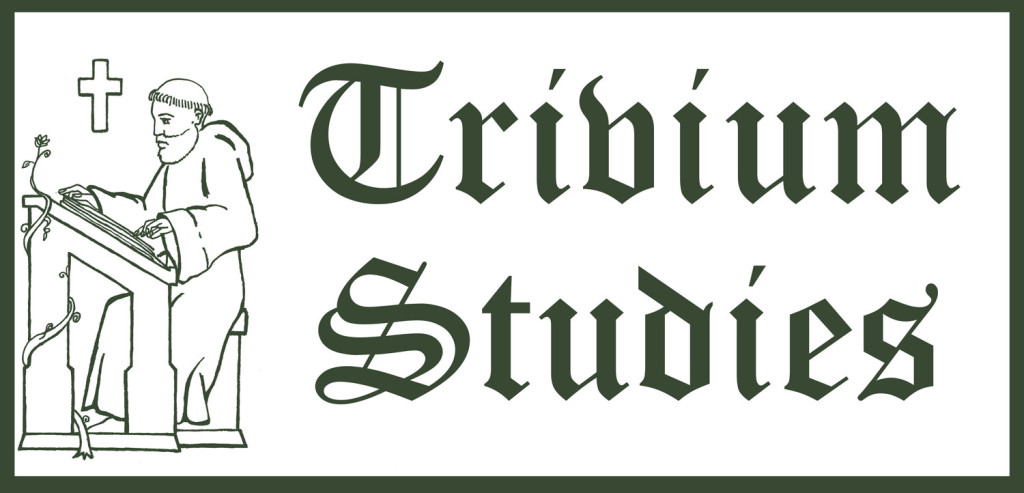
Brief Overview of Trivium Studies:
 Trivium Studies teaches the “three ways” or Trivium of classical education are the language arts of grammar, logic, and rhetoric. Though they are best understood as an integrated whole, we might describe grammar as the study of the parts and pieces of language; its building blocks. Logic is the art of expressing correct reasoning using those blocks. Rhetoric is the art of communicating “well,” adding the perfections of beauty to the truths of language. Grammar is studied, formally, in our Latin program; here you find Logic and Rhetoric in years I and II. These arts are the tools that precede and make possible all further studies, especially philosophy and theology. As students move out of Trivium Studies, they spend a year on philosophy and then two years on theology.
Trivium Studies teaches the “three ways” or Trivium of classical education are the language arts of grammar, logic, and rhetoric. Though they are best understood as an integrated whole, we might describe grammar as the study of the parts and pieces of language; its building blocks. Logic is the art of expressing correct reasoning using those blocks. Rhetoric is the art of communicating “well,” adding the perfections of beauty to the truths of language. Grammar is studied, formally, in our Latin program; here you find Logic and Rhetoric in years I and II. These arts are the tools that precede and make possible all further studies, especially philosophy and theology. As students move out of Trivium Studies, they spend a year on philosophy and then two years on theology.
| 7th Grade | 8th Grade | 9th Grade | 10th Grade | 11th Grade | 12th Grade |
| Logic Primer | Logic | Rhetoric | Introduction to Philosophy | Theology 1 | Theology 2 |
Detailed Descriptions:
Logic Primer:
As a preparation for the study of formal logic, this class introduces the basic vocabulary of logic and the basic skills involved in recognizing and understanding logical terms, and statements. In addition, first steps are taken in the practices of using terms clearly, formulating judgments truthfully, and even constructing simple arguments validly. The knowledge and skills gained will make the transition into Trivium Studies 1: Traditional Logic easy and smooth. READ FULL DESCRIPTION.
Logic:
This class emphasizes the structure of logical reasoning, the form that right reasoning takes. It begins with an Aristotelian account of the three acts of the intellect: simple apprehension, judgment, and reasoning. These acts are verbalized as terms, propositions, and syllogisms, respectively. With this background, the students learn the four types of logical proposition, the square of opposition for understanding the ways in which those propositions are related, and the rules for combining propositions into syllogisms without error. The course concludes with the consideration of various complex forms of the syllogism and numerous case studies of famous arguments. The second half of the year emphasizes the practice of “translating” and analyzing “ordinary language arguments” over the introduction of new content. READ FULL DESCRIPTION.
Rhetoric:
Aristotle tells us that logic and rhetoric are closely connected, though different. Logic is ordered to scientific demonstration while rhetoric to persuasion Quintilian broadens the scope of rhetoric to include all instances of speaking well. The student who has been learning advanced grammar and syntax in the Legamus Latinam cycle, and who has taken Trivium Studies I: Logic will find a completion to our introduction to the mediaeval trivium in this class. Drawing upon Aristotle’s Rhetoric and other Greek and Roman works we will explore the three modes of persuasion, the five canons of rhetoric, the steps for apprehending the rhetorical situation, and other elements of the classical approach. Rather than a “public speaking” course, the class continues the exploration of what language and thought are that was begun in TS 1. It examines the other modes of communication that complete the logos emphasized in our logic class (pathos and ethos); it introduces us to themes that will find their full explication in Human Nature & Ethics as it considers the ethical and humane conditions that one must bear in mind when wielding the profound and dangerous thing that is language. In addition, it offers a defense of rhetoric reliant upon beauty and lays out a practical imitative approach to composition, using the five canons. READ FULL DESCRIPTION.
Introduction to Philosophy
Description Coming Soon! READ FULL DESCRIPTION
Theology 1
This course, following the division between natural and revealed theology covered in Trivium Studies 3, considers the divine by means of the natural abilities that man possesses. We will consider the nature and knowability of God; God’s attributes; and God’s Law and its knowability; the basis for natural law. The overarching goal is to look closely at what we can know, reasonably contend, or suspect in mystery about the Divine, basing our activity upon those gifts that we possess, naturally, as humans. We will make use of the writings of some of St. Thomas’ contemporary interpreters as well as those of St. Thomas himself.
This is intended as our introductory high school course in systematic theology because it focuses upon what is best known to man by nature as a preparation for understanding the more profound truths that God teaches us in Divine Revelation. It prepares the student to more fully grasp and appreciate the implications of the Gospel of Christ. READ FULL DESCRIPTION.
Theology 2
This course considers the divine by means of the truths revealed by God and unknowable by the natural abilities of man alone. Each of the main sources of knowledge in faith: scripture, the Fathers, the teachings of the Church, and the work of theologians will be discussed. An overview of some of the basic dogmatic theology about the incarnation and the Trinity will be considered. The course will close with an overview of the practical means for spiritual growth available in the Tradition: lexio divina, prayer, the sacraments, and the liturgy of the hours. The most basic questions of the class will be “Who is Christ?” and “What Does this tell us about God?”
This is intended as our second high school course in systematic theology because it focuses upon how revelation builds upon what we know of God by natural means and develops the students understanding of the means of revelation, as well as some of the essential truths of the Christian Faith. Most importantly it explores who Christ is and what it means for us. READ FULL DESCRIPTION.

